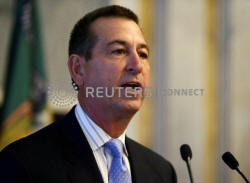Fingerprints and finances: next Wells Fargo CEO will be
under regulatory microscope
 Send a link to a friend
Send a link to a friend
 [May 21, 2019]
By Pete Schroeder [May 21, 2019]
By Pete Schroeder
WASHINGTON (Reuters) - From submitting
their fingerprints to giving up their tax records, Wells Fargo & Co's
next chief executive will go through a vetting process that could rival
that of top U.S. government officials.
Comptroller of the Currency Joseph Otting said last week he would invoke
a little-known law to review Wells Fargo's board pick to replace Tim
Sloan, who in March became the second CEO to leave the bank amid a
series of customer abuse scandals.
Created during the savings-and-loan crisis, the 1989 law allows
regulators to vet and veto candidates for senior roles at banks, but
that power is typically reserved for financially troubled firms.
Regulatory sources said the review by the Office of the Comptroller of
the Currency (OCC) was so unusual because Wells Fargo, the nation's
fourth-largest lender, is both financially sound and so big.

The CEO candidate must complete a 17-page document detailing their work
history, qualifications, finances and business dealings. They must also
agree to hand over their tax records, provide copies of their
fingerprints and possibly submit to a background check, according to
public OCC documents.
Otting will have some discretion, however, as to just how far the agency
goes in using its extensive powers to dig into the candidate's
background.
The unusual burden underscores how much work the San Francisco-based
bank still has to do to regain the trust of its regulators and further
raises the bar for its CEO search.
"Finding a new CEO was going to be difficult before, but this has made
it even harder," said Isaac Boltansky, director of policy research at
Washington-based Compass Point Research & Trading. "The difficulty was
upped to 10."
Regulators expect bank CEOs to be suitable for the top job and do not
typically become involved in the selection process.
"That reflects a lack of trust in the institution's ability to solve
their problems," said Thomas Vartanian, a law professor at George Mason
University and former OCC official.
Another former OCC official who spent decades with the agency said he
could not recall a comparable case.
"What makes it unusual is it's in a bank of this size," said the former
official, who requested anonymity to discuss an enforcement matter. "It
shows the OCC is taking this seriously."
Wells Fargo and the OCC declined to comment. Spencer Stuart, the
executive search firm hired to find Sloan's replacement, did not respond
to requests for comment.
[to top of second column] |

Joseph M. Otting speaks after being sworn in as Comptroller of the
Currency in Washington, U.S., November 27, 2017. REUTERS/Joshua
Roberts/File Photo

If Otting decides to use all his powers, the vetting process could
resemble that undergone by Senate-nominated officials.
Candidates would have to detail a range of firms they are or have been
associated with, and any parallel discussions with potential rival
employers.
They would also have to disclose if they have been involved in a failed
regulatory application, such as for a merger or license, or associated
with a firm that failed, defaulted on an obligation, or was subject to
enforcement actions, criminal action, litigation or other legal woes.
The background probe could also draw on information provided by the FBI,
state regulators, the Treasury's anti-money laundering bureau, the
Securities and Exchange Commission and the Department of Homeland
Security, among others. Minor traffic violations need not be included.
The regulatory and political scrutiny "is going to discourage some
candidates," said Steve Potter, CEO of Odgers Berndtson US, an executive
search firm that has helped other banks hire CEOs.
Extensive vetting has claimed candidates for government posts, including
Andrew Puzder, U.S. President Donald Trump's first pick for Labor
Secretary. He withdrew from consideration in 2017 after it emerged he
had employed an undocumented housekeeper.
The OCC has up to 90 days to screen the bank's pick and discretion to
reject them if they do not have the "competence, experience, character,
or integrity" for the job, according to the OCC documents. Wells Fargo
can appeal a rejection.
Otting has not said if he will use all his vetting powers and can waive
those he feels are redundant.

But he is unlikely to cut corners amid pressure from congressional
Democrats, who have frequently accused the OCC of being too soft on the
industry, Boltansky said.
"Why would Otting use up any of his limited political capital to help a
bank that continues to trip on its own shoelaces?"
(Reporting by Pete Schroeder; Editing by Michelle Price and Meredith
Mazzilli)
[© 2019 Thomson Reuters. All rights
reserved.] Copyright 2019 Reuters. All rights reserved. This material may not be published,
broadcast, rewritten or redistributed.
Thompson Reuters is solely responsible for this content. |